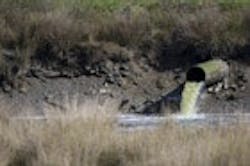A Bush administration rule that would have given a greater percentage of federal funding to states that use fees to administer their Clean Water Act permit programs was recently withdrawn by the U.S. Environmental Protection Agency (EPA), E&E News PM reported. The agency issued the rule in September 2008.
The rule would have shifted money designated to help states with the administrative costs of National Pollutant Discharge Elimination System (NPDES) permitting of municipal and industrial discharges.
Industry critics lobbied against the rule, claiming it was an attempt to get states to fully fund their own NPDES programs.
"The problem with the permit fee program is instead of giving money to states across the board, they're trying to create a program to get states to fund themselves," said Nathan Gardner-Andrews, counsel for the National Association of Clean Water Agencies. "If the federal government removed federal money somewhere down the line in the future, it would have been a real disaster."
The government provides approximately $220 million a year to help states run the program, said Linda Eichmiller, the executive director of the Association of State and Interstate Water Pollution Control Administrators.
Eichmiller praised EPA's decision to withdraw the rule, saying funding environmental programs should be a policy decision made by states. She noted that the rule change stemmed from a request by the Bush White House's Office of Management and Budget. "There have been states that have had to become pretty dependent on fees by their Legislature, and it's like a three-legged stool," Eichmiller said. "If you were in Michigan right now, and you were very heavily fee-dependent, your water program would be in big trouble because of the economic situation."
Primarily smaller companies and utilities would have been hurt by the rule, Eichmiller said. "The Dow Chemicals and the Chicagos of the world, they have deep pockets, but small communities and small industries don't," she said.
The program draws money from states without fee programs, she noted, and directs it to those that already have a steady cash flow from permit fees. "That sort of incentive seemed to be a little counterproductive to the overall goal of water quality," Eichmiller said.
The rule would have raised costs on permitted entities applying for NPDES permits, Gardner-Andrews said. "That would have particularly negative consequences for public wastewater utilities, many of which are already struggling to meet financial requirements," he noted.
According to EPA, any funds that would have been used for the financial incentives will instead be allocated to states under an existing grant formula.
Source: E&E News PM
